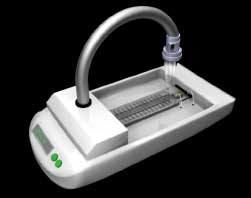Apr 17 2008
NANOIDENT Technologies AG, a leader in the development and manufacture of printed semiconductor-based optoelectronic sensors, today announced the closing of a multiparty agreement with German company microfluidic ChipShop to develop a unique airborne pathogen detection system for the European Defence Agency.
 The Patho-ID Chip, designed for the European Defence Agency, will
provide rapid, highly sensitive detection of airborne pathogens.
The Patho-ID Chip, designed for the European Defence Agency, will
provide rapid, highly sensitive detection of airborne pathogens.
The goal of the project is to develop an autonomous lab-on-a-chip based system, called the PathoID-Chip, for the detection of airborne chemical and biological agents. The system will be able to simultaneously test for multiple pathogens, in a shorter time and with greater sensitivity than is possible with conventional test methods. Tests will be completed in minutes and will be repeated every ten minutes; statistically, this is less time than it should take for a person to become infected. As a result, the presence of harmful substances can be detected in minutes and action can then be taken to reduce exposure.
To achieve these goals, the project combines several novel technologies to collect a sample from the air, inject it into liquid, process it and perform analysis. Other partners in the project include Clemens GmbH, Bundeswehr Institute of Microbiology, Friedrich- Loeffler-Institute, Joanneum Research Forschungsgesellschaft mbH, and Bertin Technologies. NANOIDENT ’s technology is a core element of the system, and represents a major advance in point-of-use testing. Because optoelectronic sensors are printed onto each chip, the system does not require laboratory handling or bulky, power-hungry, expensive optical readout equipment, making it much more portable, rugged, and tolerant of dust than conventional test systems. The proximity of the sensor to the sample also results in much higher sensitivity than conventional systems.
“Our unique printed sensor technology makes it possible to develop a truly mobile detection system, offering faster detection and minimizing exposure to harmful chemical and biological agents,” said Dr. Max Sonnleitner, VP of NANOIDENT’s Life Sciences division. “We are proud to contribute a key enabling technology to this innovative project and to be a part of such an outstanding team.”